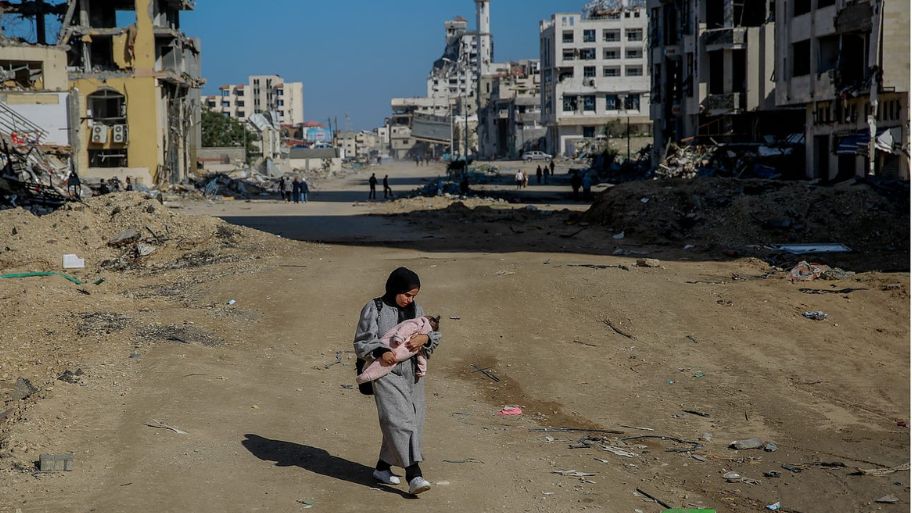
Curated by FG Contributor Samiha Hossain

Salma, a 29-year-old, carries her infant while walking on Rashid Street, west of Gaza City, on 11 January 2024. Photo: UNICEF/Omar Al-Qattaa
UN Women published “Gender alert: The gendered impact of the crisis in Gaza” last week, showing how the genocide Israel is committing in Gaza is experienced differently by men and women, boys and girls, the elderly and the young. More than 24,620 Palestinians have been killed in the Gaza Strip and more than 1.9 million people have been displaced, including almost 1 million women and girls. The entire population of Gaza — roughly 2.2 million people — face acute food insecurity.
Gaza’s only two women’s shelters, both in Gaza City, are now closed, and telecommunications and electricity blackouts severely restrict the ability to provide services remotely. The number of households where a widowed woman has the sole responsibility to feed, protect, and provide for her family may have surged by at least 3,000, as men have been killed throughout Gaza; those deaths may have also resulted in at least 10,000 children losing their fathers. Moreover, the only functional maternity hospital in northern Gaza is expected to run out of fuel, with delivery of further fuel severely challenged by insecurity.
With acute food insecurity at unprecedented levels, women and girls are expected to be hit the hardest, as women tend to when access to food is restricted. Pregnant and lactating women are at even higher health and malnutrition risks, both for themselves and their babies. Women’s rights organizations continue to operate despite the hostilities, but many staff members are themselves forcibly displaced, and the majority of their physical infrastructure has been destroyed. Ten out of twelve women’s organizations in the Gaza Strip reported being at least partly operational in November 2023.
Many older people like us stayed behind and are left to our fate. I am scared, exhausted, and expecting the worst. God will have mercy on us. – 72-year-old woman in Gaza City
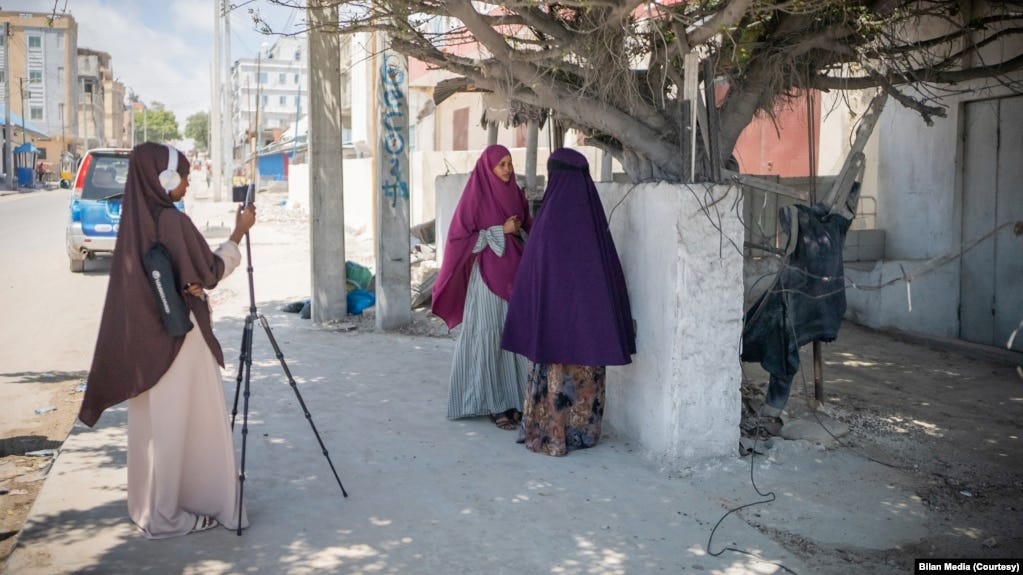 Journalists from the Somali women-led newsroom Bilan are seen on assignment. (UNDP/2022/Said Fadhaye)
Journalists from the Somali women-led newsroom Bilan are seen on assignment. (UNDP/2022/Said Fadhaye)Women journalists in Somalia face multiple risks. In early January 2017, journalist Shukri Aden Hussein received an anonymous call, conveying an order to leave the government station. Hussein, 27, said she knew who called her: It has been documented that al-Shabab militants send threatening phone calls to journalists to influence their coverage, and to business owners to extort money from them. Hussein said she did not take the call seriously initially, but things got real after a second phone call about a month later.
Hussein has not been covering political and security issues at all. She chose to cover mostly social issues — health, education, sports and business — it’s what her family and some of her listeners encouraged her to do. But what bothered the al-Shabab caller is her association with the regional government-run radio station, Radio Southwest, where she started her journalism career.
The al-Shabab militant group has been blockading several towns for a long time as a punishment for supporting the government. The militant group has been attacking any persons, vehicles or donkeys smuggling food and goods into the besieged towns. One of those towns is Huddur in the Southwest Bakool region where another journalist, Shukri Ismail Ahmed, was assigned to file a report. She said she covered the story of nomad women who defy al-Shabab and smuggle food into the town to sell to feed their families. If those women are caught by al-Shabab, the punishment will be death.
The security threat is not exclusive to women journalists. Somalia has been one of the most dangerous places for journalists in the world. Dozens of journalists have been killed since 2007 when al-Shabab launched deadly violence against the Somali government and the troops from African countries supporting it. Two media rights watchdogs say they documented at least eight incidents last year where journalists were killed, or injured, arrested, threatened and intimidated and their equipment confiscated. But women journalists also face specific challenges including cultural challenges and disparity at workplaces, activists say.
Farhia Mohamed Kheyre who chairs the Somali Women Journalists Organization says women have to deal with other obstacles that their male colleagues do not, including cultural challenges. Some newsmakers and religious experts prefer to be interviewed by male journalists, she said.
For instance, if a woman wants to interview a religious scholar it can be difficult to get them quickly. It is possible that the religious scholar would say to the station why not send me a man. That makes women feel disappointed. They feel men are being preferred to get the information instead of them. -Farhia Mohamed Kheyre
Twenty-six-year-old journalist Anfa Aden Abdi who heads the gender desk at the Somali Journalist’s Syndicate, a media rights organization, said among the main issues is the lack of equal pay for male and female journalists – sometimes women earn 50% less than their male colleagues, despite making the same effort. Kheyre, whose organization has 273 registered female media members, says she is focusing on the development of women journalists and improving equal opportunity in the workplace for men and women. She said women journalists lag in training opportunities and holding key positions at media stations. Next month, SWJO will be concluding a training that has been ongoing for 20 women in media ethics, editorial roles and administration, and they will be filling the need at stations with skilled female journalists, Kheyre said.
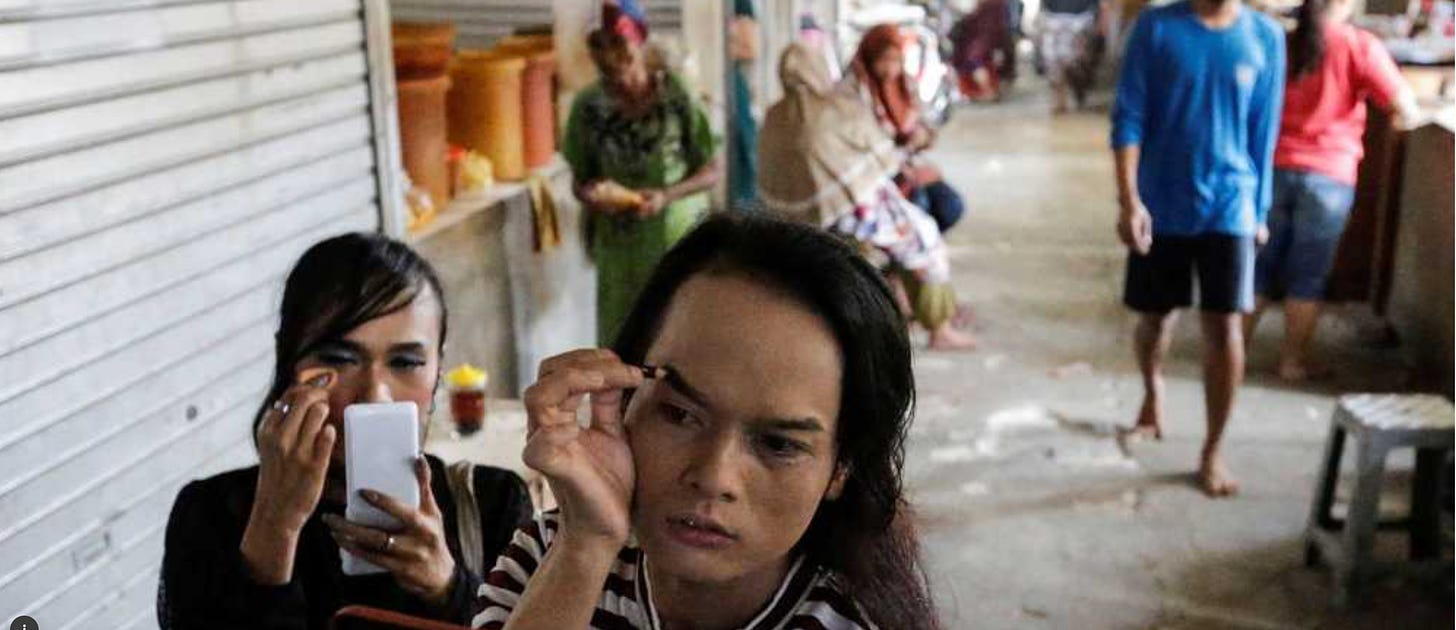 Trans women prepare before a Trans Super Heroes fashion show at a traditional market in Jakarta, Indonesia, December 17, 2023. REUTERS/Ajeng Dinar Ulfiana
Trans women prepare before a Trans Super Heroes fashion show at a traditional market in Jakarta, Indonesia, December 17, 2023. REUTERS/Ajeng Dinar UlfianaHundreds of trans women will be able to vote for the first time in Indonesia’s February 14 election after getting KTP identity cards.
At 53, Mak Luké, a transgender woman, will go to the polls for the first time next month after finally obtaining a government identity card. Like many trans Indonesians, Mak Luké left her family as a teenager and ended up living on the streets, making it difficult for her to apply for an ID card. That meant she could not access public services, open a bank account – or vote.
Even going to the doctor was “very difficult” without the document, known as the KTP, Mak Luké said. She finally got her KTP in 2021 with support from Jakarta-based LGBTQ+ rights group Suara Kita, which has helped obtain ID cards for hundreds of trans women – who tend to face more stigma and marginalisation than trans men or other LGBTQ+ Indonesians.
She said it has been life-changing – even if the document still carries her male birth name and gender assigned at birth.
Trans people in many countries are fighting for their gender identity to be recognised on official documents, but trans Indonesians can only change their legal gender if they have had gender reassignment surgery. Despite the many challenges trans Indonesians face today, gender-fluid communities have historically been accepted in the country. The Bugis ethnic group on Sulawesi island, for instance, traditionally recognises five genders, including one that is said to “transcend”, or combine, female and male.
The problems to get an ID card for trans women is a reflection of the problem that people living below the poverty line face. -Hartoyo, 46-year-old LGBTQ+ activist, one of Suara Kita’s founders
A memorandum of understanding (MOU) was drawn up in 2021 by Indonesia’s federal Ministry of Home Affairs to resolve issues such as missing legal identity documents at the local administrative level, rather than cases being sent to Jakarta. The MOU has drastically decreased the time it takes to process these complex cases, from three months to a week, and sometimes an ID card is processed within hours. That followed 10 years of lobbying by Suara Kita, said Hartoyo, who first started working to support trans women to get ID cards in 2011. Since then, Hartoyo said Suara Kita has helped 650 trans women get new cards nationwide – a process that is ongoing.
Besides making day-to-day life easier, ensuring trans women have ID cards was a step towards giving them “a political voice”, said Irwan Hidayana, a professor of gender and sexuality studies at the University of Indonesia.
Trans women’s participation in elections is an acknowledgment that they are citizens just like other Indonesians. -Hidayana
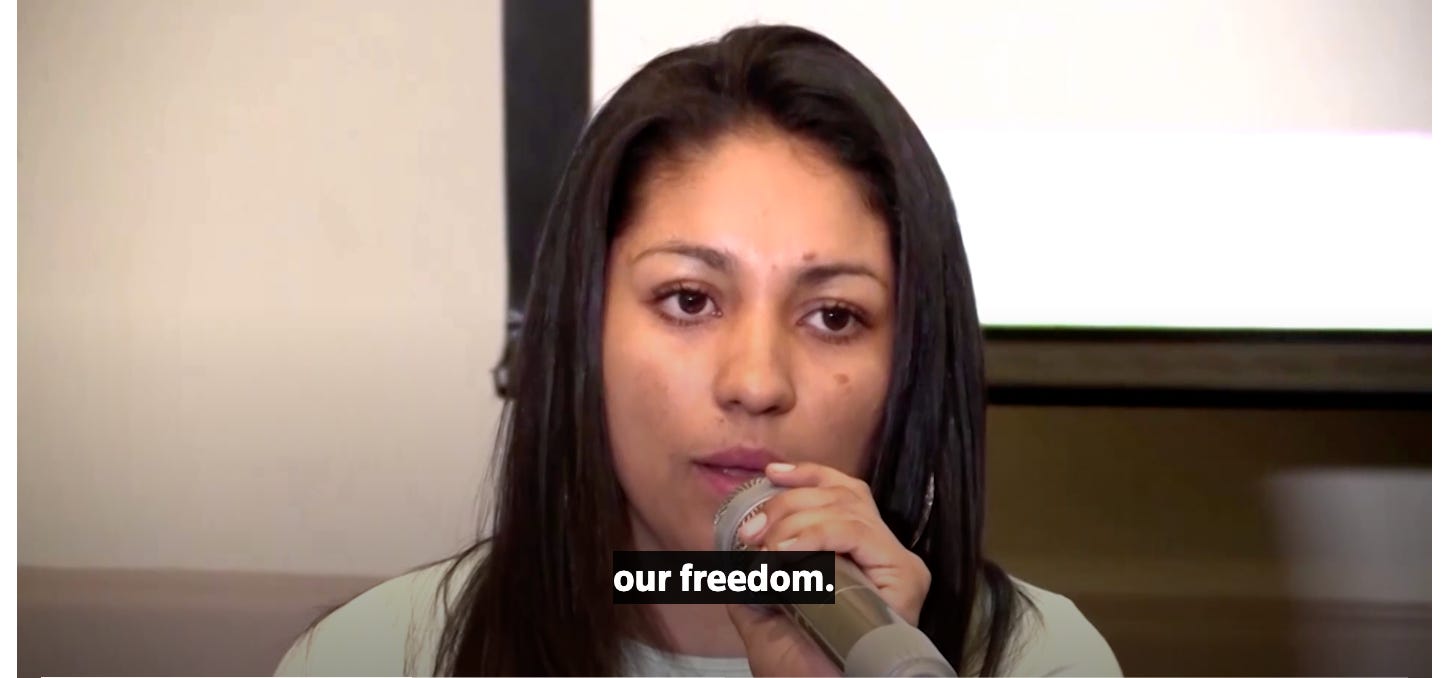
The last woman imprisoned in El Salvador on charges linked to abortion last week called for people in the country to stop denouncing women who suffer obstetric emergencies, in her first public comments since her release.
El Salvador has one of the most draconian abortion bans in the Americas, which critics say extends to women who suffer miscarriages and stillbirths. Many women have been sentenced to decades in prison on charges of killing their children.
The 28-year-old woman, known as Lilian, was the last woman still imprisoned on such charges, according to two local civil rights groups. Others still face judicial proceedings. The civil rights groups said Lilian gave birth to a girl in a public hospital, but the baby died 72 hours later while under the care of doctors. Lilian was, however, prosecuted for abandonment and neglect, and later for aggravated homicide.
Years later, a judge reviewed the 2015 sentence and acquitted Lillian on the grounds that both she and her daughter were in a vulnerable condition in the hospital when the events occurred, the groups said. Lilian, who is also the mother of a 10-year-old, said she was happy to be reunited with her family.
I call on people to stop denouncing other innocent women. -Lilian
The groups, the Citizens’ Group for the Decriminalization of Abortion and the Feminist Collective, since 2012 have campaigned for the release of women facing up to 50 years in prison on charges of aggravated homicide. They say their campaigns have helped release 73 women, though another six cases are being processed and 11 remain active because the attorney general’s office decided not to file the appeals. These women are currently not in prison.
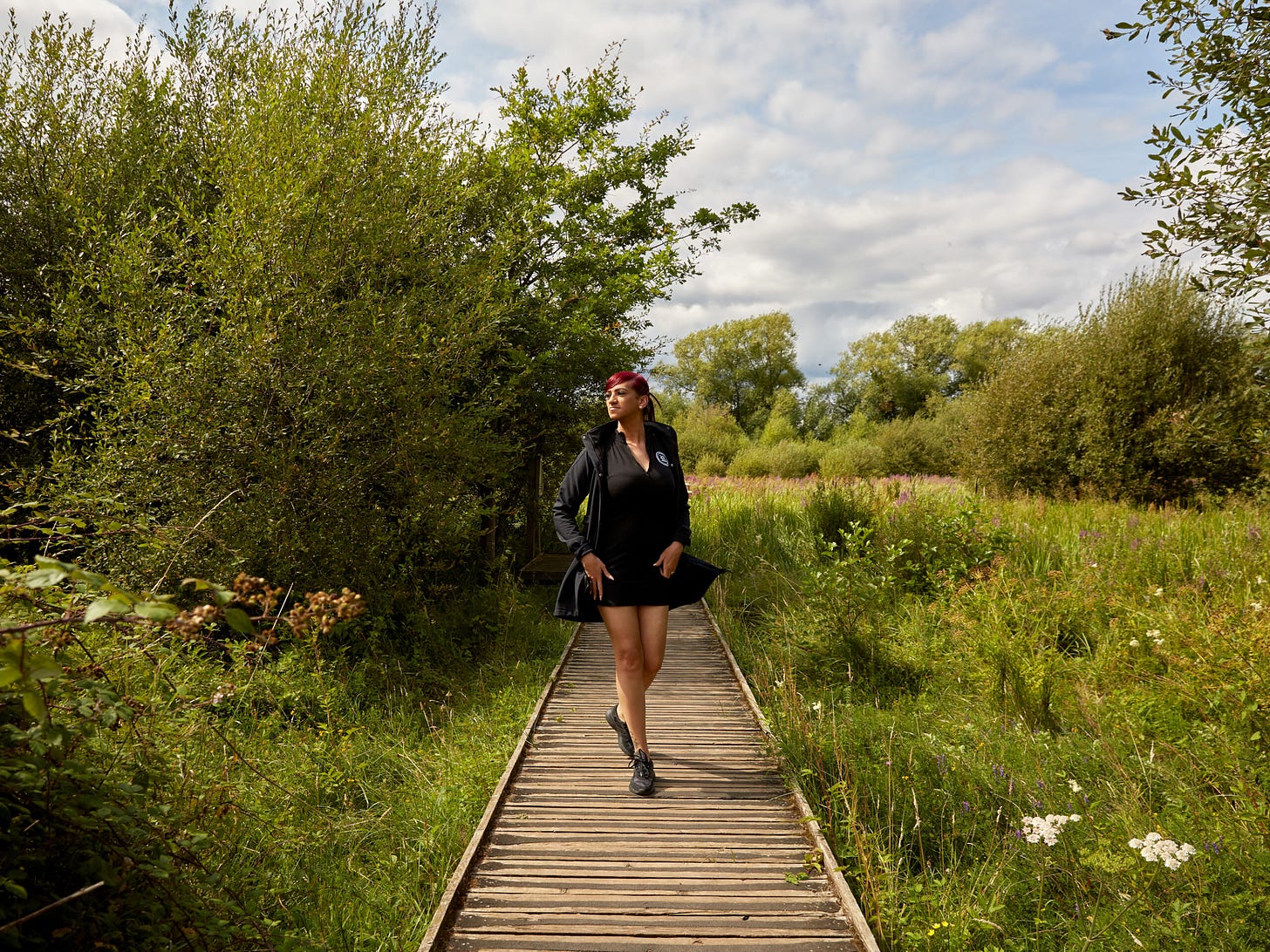
Three days before the start of the Miss Trans Global pageant, Chedino takes a break from sewing her national costume by going for a walk in the Riverside Nature Reserve in Guildford, U.K., on July 28, 2023.
Chedino Martin — a trans activist from Cape Town, South Africa, and the first ever Miss Trans Africa — had spent two months and more than 40,000 rand (approximately $2,100) designing and making the gowns, dresses and outfits for what she considered the crowning achievement of her 20-year pageant career: competing in Miss Trans Global 2023, an international advocacy pageant for transgender women. Chedino, who had just turned 40, felt like she had achieved the impossible.
A nonprofit registered in the U.K., Miss Trans Global was created by Miss saHHara, a Nigerian beauty queen and transgender rights advocate. Unlike more traditional pageants, which are primarily focused on physical appearance and talents, Miss Trans Global blended beauty with activism. Contestants were encouraged to share personal stories of discrimination, violence, societal exclusion and their journeys of self-acceptance.
You can be yourself on stage based on your own experiences. It’s not your typical beauty pageant. -Chedino Martin
Miss Nigeria, Alex Etim, who works as an outreach coordinator and HIV counselor, was keen to use Miss Trans Global as an opportunity to highlight the lack of transgender rights in their countries.
I am here because I need to be — I need to use my voice and speak up for the trans community in Nigeria. -Alex Etim
Miss Thailand Piano Sarocha Akaros won first place. Miss France won Miss Trans Global Diamond (second place), Miss England won Miss Trans Global Sapphire (third place), Miss Canada took First Princess Global (fourth place) and Chedino rounded out the Top 5, earning the title of Second Princess Global. Chedino says she’s proud to have made it into the Top 5 without any prior international pageant experience. She’s also sure she’d do it all again.
I will treasure this pageant, and I hope that more women from my community will have the opportunity to showcase themselves on an international platform. -Chedino Martin
Samiha Hossain (she/her) is an aspiring urban planner studying at Toronto Metropolitan University. Throughout the years, she has worked in nonprofits with survivors of sexual violence and youth. Samiha firmly believes in the power of connecting with people and listening to their stories to create solidarity and heal as a community. She loves learning about the diverse forms of feminist resistance around the world.



